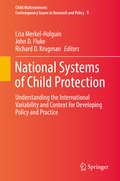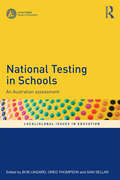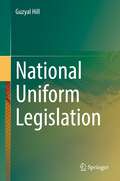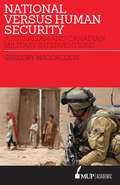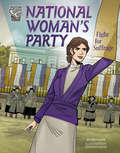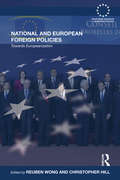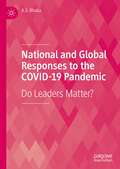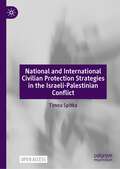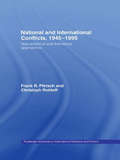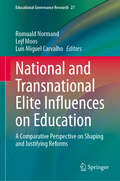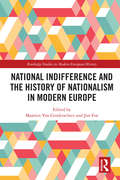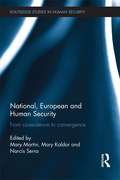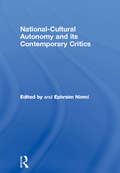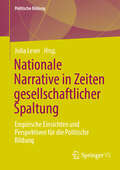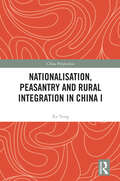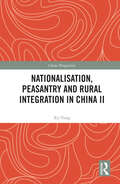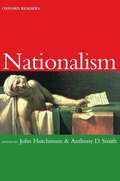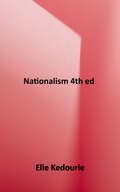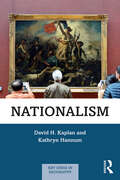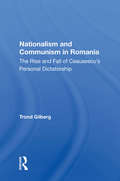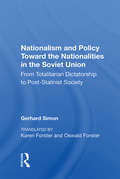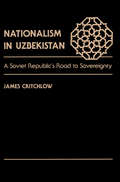- Table View
- List View
National Systems of Child Protection: Understanding the International Variability and Context for Developing Policy and Practice (Child Maltreatment #8)
by Richard D. Krugman Lisa Merkel-Holguin John D. FlukeThis volume provides a wide spectrum description analysis of the contemporary and well established child protection systems in a range of countries, such as Australia, Canada, Netherlands and Spain. It presents a brief orientation about the public and private systems involved in protecting children in each country. Further the book identifies current key policy and implementation drivers that orient the systems of child protection, such as children’s rights, family preservation, use of evidence and public health orientation. Finally it presents a critical analysis of the strengths and limitations of the systems, as well as, strategies for prospects for improving outcomes for children and their families.
National Taxation for Property Management and Valuation
by A Macleary A. MaclearyA clear and up-to-date guide to the UK tax system for surveyors and valuers which demonstrates land valuation for taxation purposes.
National Testing in Schools: An Australian assessment (Local/Global Issues in Education)
by Bob Lingard Sam Sellar Greg ThompsonOver the last two decades, large-scale national, or provincial, standardised testing has become prominent in the schools of many countries around the globe. National Testing in Schools: An Australian Assessment draws on research to consider the nature of national testing and its multiple effects, including: media responses and constructions such as league tables of performance pressures within school systems and on schools effects on the work and identities of principals and teachers and impacts on the experience of schooling for many young people, including those least advantaged. Using Australia as the case site for global concerns regarding national testing, this book will be an invaluable companion for education researchers, teacher educators, teacher education students and teachers globally.
National Uniform Legislation
by Guzyal HillThis book aims to develop a conceptual framework upon which to draw for analysis of new and existing national reforms in Australia. Due to growth in the volume and complexity of national uniform legislation, law reform agencies, the Commonwealth, state and territory governments and policy institutions have more, rather than less, to do. This book explores how they are required to respond to debates among actors from divergent geographical, commercial and ideological backgrounds, who sometimes demonstrate irreconcilable differences in values and perspectives.From a policy implication perspective, this book summarises a vast quantity of original and complex data so that it can be applied in the field—among policymakers, reformers, legislative drafters, students and the wider audience of legal practitioners working with harmonised legislation in federations. This book acknowledges that uniform legislation is not a panacea for all legal challenges currently faced by federations. However, this book takes a step towards demystifying the many confusing factors that have obscured the underlying general principles. A working theory of ‘federal harmonisation’ enables ‘the art of the impossible’ to become a practical reality. This book condenses data on legislation in models. The models enable transparent, evidence-based decisions in the process of a federation’s harmonisation to progress regulatory best practices and achieve more reliable, sustainable results.
National Versus Human Security: Australian and Canadian Military Interventions
by Gregory MacCallionBy examining two military interventions that have defined the post-Cold War period, Somalia (1992-1995) and Afghanistan (2001-2014), this book argues that for Australia and Canada, the concept of human security works better in practice than it does in theory. When human security was first advanced in 1994, debates raged. It was argued that the concept needed an agreed and articulated definition before it could have policy relevance or applicability. The book provides unprecedented access to the key actors and decision makers, including Prime Ministers, military commanders, and senior diplomats. It argues that the core concept of human security has altered states' understanding of traditional national security during the implementation of military interventions. The experience of Australia and Canada over this period demonstrates that the concept of human security is becoming more relevant to states, and their policy makers and military planners, as they conduct military interventions.
National Will to Fight: Why Some States Keep Fighting and Others Don’t
by Paul Frank Madden Lander McNerney Connable Zimmerman Posard Castillo Blum Fernandes Seol ParasilitiIn this report, RAND researchers explore the factors, contexts, and mechanisms that shape a national government’s decision to continue or end military and other operations during a conflict (i.e., national will to fight). To help U.S. leaders better understand and influence will to fight, the researchers propose an exploratory model of 15 variables that can be tailored and applied to a wide set of conflict scenarios.
National Women's Party Fight for Suffrage (Movements and Resistance)
by Emily SohnOn the morning of January 10, 1917, thirteen determined women stood at the gates of the White House and held banners reading “HOW LONG MUST WOMEN WAIT FOR LIBERTY?” They were there to force President Woodrow Wilson to take notice of their demand for the right to vote. It was the first day of weeks of picketing, which would stop only when the women were arrested and jailed. Despite criticism from the public and mistreatment by public officials, the suffragists were determined to gain the right to vote. Their resilience and dedication fueled a movement that brought progress to the lives of women.
National and European Foreign Policies: Towards Europeanization (Routledge Advances in European Politics)
by Christopher Hill Reuben WongNational and European Foreign Policy explores the processes of interaction between the national and the European levels in foreign policy making in European Union states. The volume also assesses the mutual influence which the Member States exert on each other, independent of the EU institutions, thus tracing the extent to which Member State foreign policies are being Europeanized into more convergent, coordinated policies. With chapters examining France, Germany, Italy, UK, Denmark, Greece, Spain, Finland, Poland and Slovenia, the overarching questions the volume addresses centre on the nature of the relationship between the foreign policies of the Member States and ‘European’ foreign policy. Engaging with ‘Europeanization’ with theoretical rigour, the contributors to this volume examine the EU’s impact on the foreign policies of Member States old and new, the impact of the Member States on the EU’s external relations, and the influence of the Member States on each other’s foreign policies. Providing interesting detail on changes in foreign policy thinking and national policies using the concept of Europeanization, National and European Foreign Policy will be of interest to students and scholars of European politics and policy formation, foreign policy and International Relations.
National and Global Responses to the COVID-19 Pandemic: Do Leaders Matter?
by A.S. BhallaThis book traces the evolution of Covid across different geographic regions, showing how the varying responses of leaders, citizens and other key stakeholders in efforts to tackle the Covid crisis determined outcomes. It finds that leadership, in particular, played a critical role, while initial conditions, such as health-care spending and infrastructure are important factors contributing to a country’s preparedness in coping with a pandemic.
National and International Civilian Protection Strategies in the Israeli-Palestinian Conflict
by Timea SpitkaThis open access book examines security and protection within Israel and Palestine, analyzing national and international security strategies that apply to the protection of civilians. The author examines the principles, practices and the perception of protection. Focusing on protection strategies and practices in the Israeli-Palestinian conflict, this book reveals some of the myths and enigmas of national and international protection of civilians. The book moves beyond the current lack of protection strategies to discuss more effective human security focused on prioritizing protection of civilians, use of alternative tools such as community policing and inclusive protection.
National and International Conflicts, 1945-1995: New Empirical and Theoretical Approaches (Routledge Advances in International Relations and Global Politics #11)
by Christoph Rohloff Frank R. PfetschThe information flow about crises and conflicts is highly selective, the media only focus on a few major conflicts at a time. Many conflicts are neglected, others soon forgotten after the fighting ends. This book fills the gaps and offers a systematic overview of all crises and conflicts in and among states since 1945 and traces the global trends of conflict development.Based on the broad empirical basis of the Conflict Simulation Model KOSIMO, Pfetsch and Rohloff use an integrated approach to cover many forms and types of political conflicts, both peaceful and violent.
National and Transnational Elite Influences on Education: A Comparative Perspective on Shaping and Justifying Reforms (Educational Governance Research #27)
by Romuald Normand Lejf Moos Luís Miguel CarvalhoThis collection focuses on transformations in the governance of education, paying attention to the trans-nationalisation of educational policies and the emergence of new actors in education. It focuses on the knowledge and instruments of government that shape education systems at different scales of governance. The book is a contribution to this field of research, focusing on the new roles and responsibilities of elites inside and outside the education state. It offers in-depth case studies based on an international comparison, examining the dynamics at work in the production and circulation of knowledge, the interplay of interests and power, and the ability of elites to define and lead public action programmes. The research and reflections presented in this book will help students, researchers, practitioners and policy-makers to better understand the transformations in decision-making at a time of globalisation and nationalism in education.
National indifference and the History of Nationalism in Modern Europe: National indifference and the History of Nationalism in Modern Europe (Routledge Studies in Modern European History)
by Maarten Van Ginderachter Jon FoxNational indifference is one of the most innovative notions historians have brought to the study of nationalism in recent years. The concept questions the mass character of nationalism in East Central Europe at the turn of the nineteenth and twentieth century. Ordinary people were not in thrall to the nation; they were often indifferent, ambivalent or opportunistic when dealing with issues of nationhood. As with all ground-breaking research, the literature on national indifference has not only revolutionized how we understand nationalism, over time, it has also revealed a new set of challenges. This volume brings together experienced scholars with the next generation, in a collaborative effort to push the geographic, historical, and conceptual boundaries of national indifference 2.0.
National, European and Human Security: From Co-Existence to Convergence (Routledge Studies in Human Security)
by Mary Kaldor Mary Martin Narcís SerraThis book examines how national security strategies relate to an emerging common European or global vision of security, and to human security ideas. Human security and national security are often regarded as competing and mutually antagonistic; the former was proposed and has been operationalised in ways which represent a paradigm shift away from state-centric approaches and the dominance of national-security perspectives. This has led to human security being associated with a broadening of the security agenda to encompass not only physical security, the use of force and military capabilities, but also the provision of material well-being and dignity to vulnerable communities. This edited volume seeks to identify key concepts and themes in the national discourse of several European countries, addressing security at a meta-narrative and conceptual level, illustrating the changes taking place in approaches to security, and in particular, mapping moves away from a paradigm of ‘national security’ to one which might be called ‘human security’. It also enables an assessment of whether national security is currently converging at either European or global levels. This book will be of much interest to students of human security, European politics, discourse analysis, war and conflict studies, and IR/security studies in general.
National-Cultural Autonomy and its Contemporary Critics (Routledge Innovations in Political Theory #Vol. 16)
by Ephraim NimniIn his seminal essay 'Staat und Nation' ('State and Nation') Karl Renner presents his model for national-cultural autonomy, with a two-tier system of government that devolves considerable non-territorial autonomy to national communities, while sustaining the administrative unity of the Multination State. This new book delivers the first English translation of 'State and Nation' and brings together a collection of distinguished and leading political scientists to provide a detailed and critical assessment of Renner's theory of national-cultural autonomy. From a variety of perspectives, the contributors discuss the contemporary validity of Renner's arguments paying particular attention to theories of state, liberal democracies, minority nationalism and multiculturalism, and models of regional integration.Making an important contribution to the literature on nationalism and national minorities, this volume is a vital research tool for students and scholars of nationalism and political theory. Readers of this volume may also be interested in the forthcoming companion volume by Ephraim Nimni, Multicultural Nationalism
Nationale Narrative in Zeiten gesellschaftlicher Spaltung: Empirische Einsichten und Perspektiven für die Politische Bildung (Politische Bildung)
by Julia LeserDieses Buch befasst sich mit einem drängenden Problem, das auch in Deutschland virulent ist: der Wiederkehr populistischer Nationalismen und migrationsfeindlicher Einstellungen. Der Band untersucht, wie sich Vorstellungen kollektiver Identität in der deutschen Gesellschaft in Zeiten von Migration und Pluralisierung gestalten – besonders angesichts der wachsenden Ablehnung, die sich im Zusammenhang mit rechtspopulistischen Wahlerfolgen in Deutschland und darüber hinaus zeigt. Zum einen fasst der Band Forschungsergebnisse aus Gruppendiskussionen und ethnografischen Studien in Berlin, Sachsen, Schleswig-Holstein und Thüringen zusammen, die die Funktionen nationaler Narrative in Zeiten gesellschaftlicher Umbrüche beleuchten. Zum anderen geht es um die Herausforderungen für die Politische Bildung und um Modellprojekte, die gesellschaftliche Spannungen auf lokaler Ebene adressieren.
Nationalisation, Peasantry and Rural Integration in China I (China Perspectives)
by Xu YongAs the first volume of a two-volume set, this book systematically examines the process of rural reconstruction in China over the course of the twentieth century, taking into account politics, labour and resources, administration, and institutional integration. The nationalisation of rural China was a two-way and changing process. This volume attempts to clarify that state penetration of the countryside and the transformation of the rural population consolidated modern state governance by first, providing an overview of the fundamental concepts necessary for understanding nationalization, rural integration, and the peasantry. Secondly, analysis of the unified allocation of land, products, and labour resources and how they fundamentally integrated rural society into the state system is carried out. Third, the volume also explores the rural reforms that emerged in the late 1970s and their impact on the social development of rural China. Lastly, the process by which modern China implemented policies to organize a decentralised rural society and to strengthen the political trust of peasants is analysed. The book will be essential reading for scholars and students in Chinese Studies, Political Science, Rural Studies, and those who are interested in the rural reconstruction of China in general.
Nationalisation, Peasantry and Rural Integration in China II (China Perspectives)
by Xu YongThis two-volume set examines the process of rural integration in modern China. In short, this is how the state penetrates the countryside and transforms the rural population, thus consolidating the foundation of modern state governance. Drawing on contemporary examples of state integration while observing the background of traditional China, this book systematically examines the entire process of rural reconstruction of China over the course of the 100 years since the late Qing Dynasty. In addition, the book discusses the special characteristics of each period and current societal trends in the Chinese countryside. This volume explores the following aspects of contemporary state integration: economic, fiscal, cultural, social, lifestyle, and technological. The book will be an essential reading for scholars and students in Chinese Studies, Political Science, Rural Studies, and those who are interested in the rural reconstruction of China in general.
Nationalism
by John Hutchinson Anthony D. SmithNationalism is one of the most powerful forces in the modern world, yet its study has only recently gained popularity. This reader gives historical depth to the recent debates on nationalism and traces the development of thought on nationalism across a wide range of issues with reference to texts spanning from Ernest Renan's What is a Nation? in the 1880s to current views given in the 1990s. Issues covered include the definitions of the nation and of nationalism, theories of nationalism, the origins of nations, nationalism in Europe, the Third World and within the International System, and the future of nationalism itself.
Nationalism
by Elie KedourieThis edition of Elie Kedourie's Nationalism brings back into print one of the classic texts of our times. With great elegance and lucidity, the author traces the philosophical foundations of the nationalist doctrine, the conditions that gave rise to it, and the political consequences of its spread in Europe and elsewhere over the past two centuries. As Isaiah Berlin wrote of the original edition, "Kedourie's account of these ideas and their effect is exemplary: clear, learned and just." In a new introduction the author reflects upon the origins of the book and the relationship of his argument to contemporary nationalist conflicts.
Nationalism (Key Ideas in Geography)
by David H. Kaplan Kathryn HannumNationalism provides a comprehensive exploration of nationalist identity, ideology, and practice which centers the geographic underpinnings of the phenomenon. It unpacks the fundamental principles and the many variations of this global phenomenon, as it examines nationalism through a spatial lens. Nationalism is the dominant political force in the modern world and no other global ideology is so strongly tied to concepts like territory, homeland, frontiers, and boundaries. The authors delve into how nationalism is fundamentally related to territory and place, why mapping is critical to the nationalist endeavors, the role of performance and personification, ethnonationalism, multinationalism, nationalist movements, and how nationalism is evidenced and experienced in cities and towns throughout the world. These provide a solid summary of what makes nationalism so compelling, so uniting, and so dangerous. Nationalism provides a fresh and compelling perspective on a complicated and often controversial subject. Written in an accessible and attractive style, the book will be especially useful for classes in Geography, Global Studies, International Relations, Political Science, Sociology, History, and Anthropology. It provides information and conceptual insights to scholars interested in a concise and sophisticated synthesis of contemporary nationalism. For casual readers interested in the phenomenon of nationalism, this book provides clear explanations and compelling examples.
Nationalism (Penguin Great Ideas)
by Rabindranath TagoreTagore was a fierce opponent of British rule in India. In this work he discusses the resurgence of the East and the challenge it poses to Western supremacy, calling for a future beyond nationalism, based instead on cooperation and racial tolerance.GREAT IDEAS. Throughout history, some books have changed the world. They have transformed the way we see ourselves - and each other. They have inspired debate, dissent, war and revolution. They have enlightened, outraged, provoked and comforted. They have enriched lives - and destroyed them. Now Penguin brings you the works of the great thinkers, pioneers, radicals and visionaries whose ideas shook civilization and helped make us who we are.
Nationalism And Communism In Romania: The Rise And Fall Of Ceausescu's Personal Dictatorship
by Trond GilbergThis book analyzes Ceausescu's tools and goals, that is, party structure and how it was transformed in order to implement Ceausescu's concept of modernization which became interchangeable with the concept of building communism.
Nationalism And Policy Toward The Nationalities In The Soviet Union: From Totalitarian Dictatorship To Post-stalinist Society
by Gerhard SimonThis book examines Soviet nationalities policy from the 1920s to the present. Tracing nationalities policy to its roots in Bolshevik efforts to arrest the decay of the Russian Empire, Dr Simon looks at the evolution of Soviet policy, analyzes the reactions of non-Russian peoples to the policies and discusses the forms of expression and the goals of
Nationalism In Uzbekistan: A Soviet Republic's Road To Sovereignty
by James CritchlowDrawing from a wide range of Uzbek and Russian sources, James Critchlow analyzes significant developments leading up to Uzbekistan's declaration of sovereignty and examines the outlook for the republic's emergence as an independent international player. The author's primary focus is on the Uzbek elites' attitudes and their efforts to throw off Moscow's hegemony by using popular grievances to mobilize mass support against the central Soviet government. Critchlow traces local grievances to two roots. The first is Uzbekistan's decades-long economic exploitation by Moscow through the imposition of an intensive cotton monoculture, the accumulated effects of which have been massive environmental degradation, illness, and death. The second is the central government's failure to adequately compensate Uzbekistan for these hardships and for the republic's overall contribution to the Soviet economy, while having further impoverished Uzbeks by limiting the range of their cultural and political expression. Among the manifestations of Uzbek resistance explored here are protests against russification and compulsory military conscription; persistent and open adherence to religious traditions; and loyalty above all to local political, ethnic, and family ties-- which frequently has led Moscow to charge the republic's leadership with "nepotism" and "corruption". Now that their campaign for sovereignty has triumphed, will Uzbek leaders be able to solve the knotty political and economic problems their republic still faces? The analysis offered here illuminates this question and suggests possible answers.
